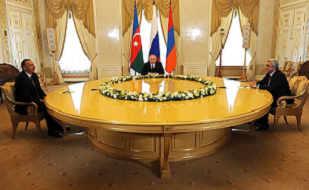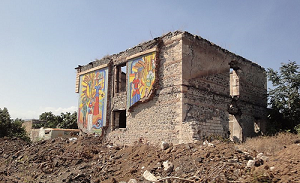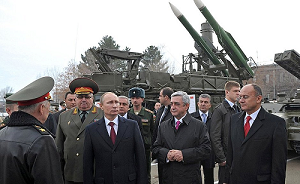Russia’s Iskander Adventures in the Caucasus
By Stephen Blank
May 12, 2017, the CACI Analyst
Since the occurrence of large scale fighting around Nagorno-Karabakh in April 2016, resulting in some Azerbaijani gains, there has been a widespread fear that this crisis could easily escalate out of control drawing in not only the two belligerents but also Russia and Turkey. Armenia’s response to the visible enhancement of Azerbaijan’s military capability has marked a qualitative escalation of the crisis’ military potential. Moreover, it has further unmasked the Russian policy of abetting the crisis rather than trying to resolve it, even though Moscow professes to be against renewed hostilities and to want a solution.

A Year After The “Four-Day War”, Guns Continue to Speak Louder than Diplomats in Nagorno-Karabakh
By Azad Garibov
April 21, 2017, the CACI Analyst
One year has passed since the “Four-Day War” – an unprecedented escalation of the Nagorno-Karabakh conflict on April 1-5, 2016 that claimed the lives of over a hundred soldiers on both sides. The conflict over Nagorno-Karabakh has never been truly frozen, yet the increased intensity of clashes since April 2016 demonstrates that violence can flare up at any time, destabilizing the already fragile region. As no peaceful solution is visible on the horizon, the Line of Contact (LoC) between Azerbaijan’s and Armenia’s armed forces has become the most militarized area of the former Soviet Union. Azerbaijani and Armenian societies have also grown increasingly nationalistic as fighting intensifies and casualty rates grow on the frontline.

The Kremlin’s Security Strategy in the South Caucasus: Implications for Baku
By Anar Valiyev
March 7, 2017, the CACI Analyst
On November 30, 2016, the defense ministries of Armenia and Russia signed an agreement to establish a joint Russian-Armenian Military Joint Task Force (MJTF). In June 2016, Armenia agreed to join Russia's regional air security system designed to protect Russia's southern borders and its allies. The treaty allowed Armenia to rely on Russia's anti-aircraft system and military satellites in order to defend its airspace. In late September 2016, it was revealed that Moscow had transferred the Iskander mobile short-range missile system to Armenia. These recent developments have raised serious concerns in Baku over Armenia's military buildup and its consequences for the Nagorno-Karabakh conflict.

Turkey reacts to Germany's Bundestag vote on Armenian genocide
By Armen Grigoryan
July 15th, 2016, The CACI Analyst
The German parliament’s resolution recognizing the atrocities against Armenians and other Christian minorities in the Ottoman Empire as genocide resulted in an angry reaction from the Turkish government. The resolution, which also mentions the former German Empire’s complicity, constitutes an additional example of modern Germany’s ability to come to terms with the past by admitting own responsibility. However, the possible tensions due to Turkey’s resentment not only makes the normalization of Armenian-Turkish relations unlikely but may also affect Turkey’s relations with other countries.






